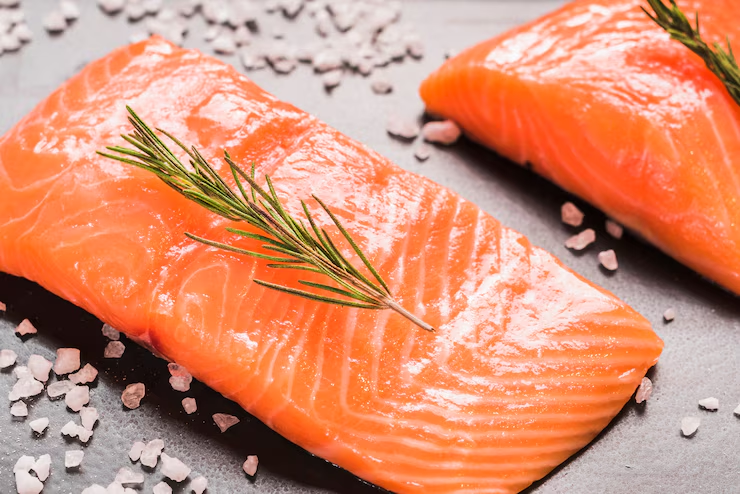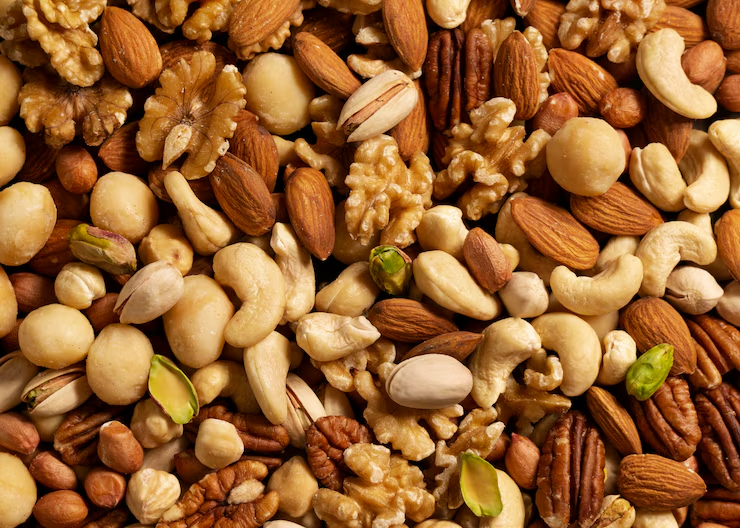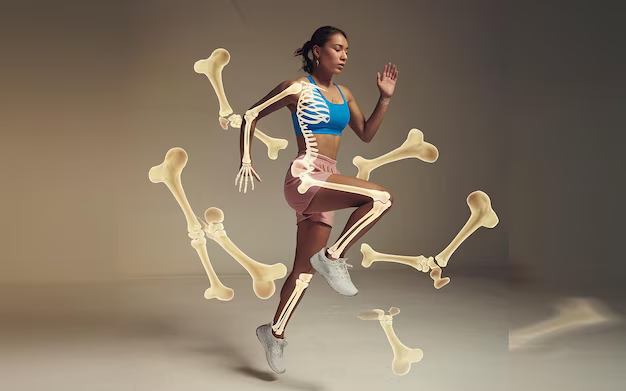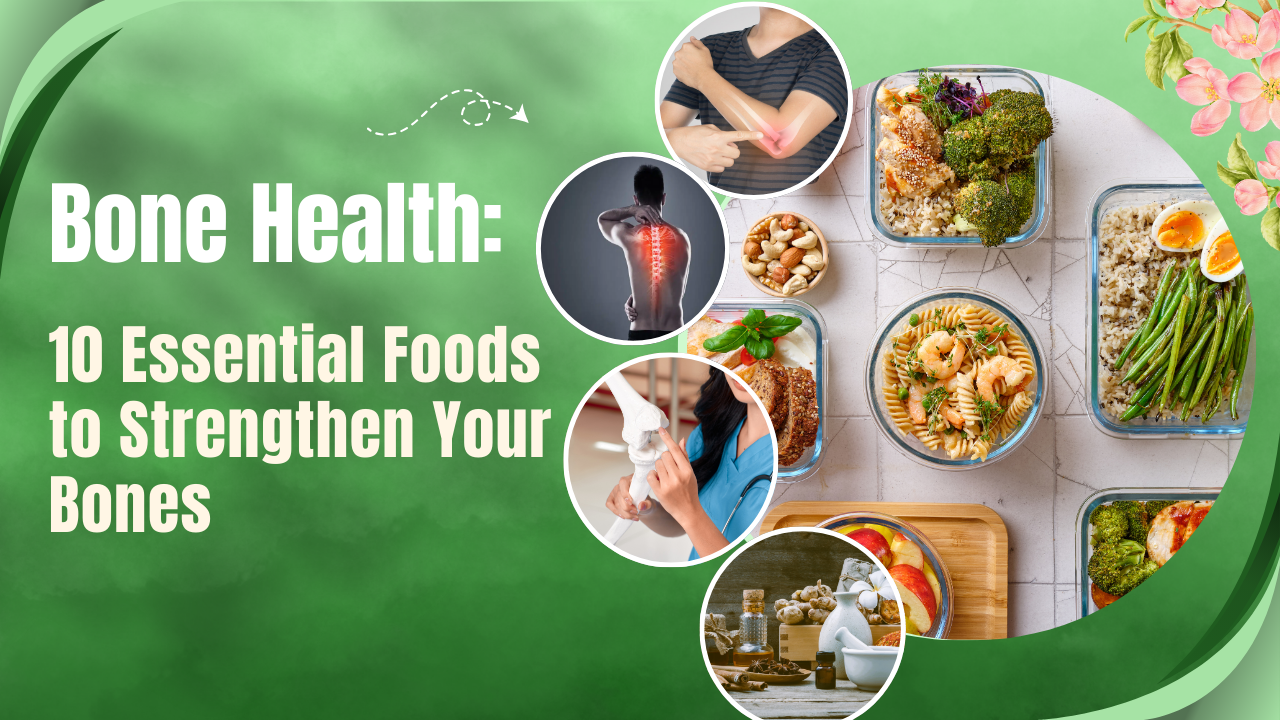Bone health is crucial for overall well-being, supporting mobility, strength, and a high quality of life. Healthy bones act as the body’s framework, supporting muscles, protecting organs, and enabling movement. As we age, bones naturally lose density, making fractures and conditions like osteoporosis more likely.
To maintain strong bones and prevent bone loss, a diet rich in bone-boosting nutrients is key. Consuming the right foods helps replenish the essential vitamins and minerals your bones need to stay strong. A balanced diet that includes these nutrient-rich foods can significantly contribute to better bone health.

This article highlights 10 essential foods that promote and support bone health. Adding these foods to your daily meals can help ensure your bones stay healthy, strong, and resilient, even as you age. By focusing on bone health through diet, you can help prevent bone-related issues and maintain an active, healthy lifestyle.
Leafy Greens: A Powerhouse of Calcium and Vitamin K
Leafy greens like kale, spinach, collard greens, and bok choy are rich in calcium, an essential mineral for bone health. Calcium forms the structural foundation of your bones, and without adequate levels, bones can become fragile and prone to fractures.
In addition to calcium, these greens are an excellent source of Vitamin K, a crucial nutrient for optimal bone health. Vitamin K plays a vital role in bone mineralization, ensuring that calcium is properly integrated into the bone structure.
Moreover, Vitamin K aids in the production of osteocalcin, a protein responsible for binding calcium to the bone matrix. This process significantly enhances bone density, contributing to stronger, healthier bones. By including leafy greens in your diet, you can support your bone health and reduce the risk of bone-related conditions as you age.
Best Leafy Greens for Bone Health:
Kale: Rich in calcium, Vitamin K, and antioxidants.
Collard Greens: High in calcium and Vitamin K.
Spinach: Contains calcium, but it also contains oxalates, which can inhibit calcium absorption, so it’s best eaten in moderation.
To include leafy greens into your diet, consider adding them to salads, smoothies, or even as a side dish with your meals.
Fatty Fish: Omega-3 Fatty Acids and Vitamin D
Fatty fish like salmon, mackerel, sardines, and herring are rich in omega-3 fatty acids and Vitamin D, both crucial for bone health. Omega-3 fatty acids have anti-inflammatory effects, which can help lower the risk of osteoporosis. They also play a role in bone remodeling, the process of replacing old bone tissue with new, healthier tissue.

Vitamin D is essential for calcium absorption, making it a vital nutrient for strong bones. Without enough Vitamin D, the body struggles to absorb calcium, which can lead to bone weakness and loss.
Including fatty fish in your diet can significantly support bone health by providing these essential nutrients. By promoting bone remodeling and improving calcium absorption, omega-3s and Vitamin D work together to strengthen bones, reduce the risk of bone-related conditions, and maintain overall bone health as you age.
Best Fatty Fish for Bone Health:
Salmon: High in omega-3s and Vitamin D.
Sardines: Provide both omega-3s and calcium, as they are often eaten with their bones.
Mackerel: Rich in omega-3s, protein, and Vitamin D.
For a quick bone-boosting meal, try grilling or baking a portion of salmon or mackerel, or enjoy sardines in salads or sandwiches.
Dairy Products: A Classic Source of Calcium and Protein
Dairy products such as milk, cheese, and yogurt are excellent sources of calcium, a key nutrient for bone health. These products are also rich in protein, which is essential for maintaining bone density and strength. Protein makes up about 50% of bone volume and 33% of its mass, meaning a lack of protein in the diet can lead to weakened bones and deterioration.
Many dairy products are also fortified with Vitamin D, which helps the body absorb and use calcium more effectively. This added Vitamin D supports overall bone health by enhancing calcium’s role in maintaining strong and healthy bones.
Including dairy in your diet can provide the necessary calcium, protein, and Vitamin D to support bone health and prevent bone loss. By ensuring you get enough of these nutrients, you can help protect your bones from deterioration and maintain their strength throughout life.
Best Dairy Products for Bone Health:
Milk: One of the most complete sources of calcium.
Yogurt: Offers calcium, protein, and probiotics for digestive health.
Cheese: A dense source of calcium and protein, especially hard cheeses like Parmesan.
Including dairy into your diet can be easy and enjoyable, whether in smoothies, cereals, or as a snack.
Nuts and Seeds: Rich in Magnesium and Healthy Fats
Nuts and seeds are an excellent source of magnesium, a vital mineral for bone health. Magnesium plays an important role in converting Vitamin D into its active form, which is essential for calcium absorption. By helping the body absorb calcium more effectively, magnesium supports stronger bones and better bone density.

In addition to aiding calcium absorption, magnesium helps regulate calcium levels in the blood, ensuring that your bones get the calcium they need to remain strong. A proper balance of magnesium and calcium is key to maintaining healthy bones.
Including magnesium-rich nuts and seeds in your diet can significantly support bone health. By promoting calcium absorption and contributing to overall bone strength, these foods play a crucial role in protecting against bone loss and deterioration. Adding them to your daily meals can help maintain strong, healthy bones as you age.
Some of the best nuts and seeds for bone health include:
Almonds: High in calcium and magnesium.
Walnuts: Rich in omega-3 fatty acids and magnesium.
Chia Seeds: Loaded with magnesium and omega-3s.
Pumpkin Seeds: Offer magnesium, zinc, and healthy fats.
Nuts and seeds can be added to smoothies, sprinkled on salads, or eaten as a quick snack to provide bone-strengthening nutrients.
Fortified Plant Milks: Non-Dairy Alternatives for Bone Health
If you’re lactose intolerant or follow a plant-based diet, fortified plant milks like almond milk, soy milk, and oat milk are excellent alternatives to cow’s milk. These plant-based options are often fortified with calcium and Vitamin D, two essential nutrients that play a vital role in bone health. Calcium is crucial for maintaining bone strength and density, while Vitamin D helps the body absorb and use calcium effectively.
Some fortified plant milks also contain Vitamin B12, another important nutrient for overall health. By choosing fortified plant milks, you can ensure you’re getting the necessary nutrients to support bone health, even without dairy.
Switching to these plant-based alternatives is a great way to maintain strong, healthy bones while adhering to dietary preferences or restrictions. Whether you’re lactose intolerant or simply prefer plant-based foods, these fortified milks offer a nutritious, bone-friendly option.
Best Plant Milks for Bone Health:
Almond Milk: Fortified with calcium and Vitamin D.
Soy Milk: Contains plant-based protein, calcium, and Vitamin D.
Oat Milk: Typically fortified with calcium and Vitamin D.
Make sure to choose plant milks that are fortified with calcium, as unfortified versions may not offer the same bone-boosting benefits.
Berries: Antioxidants for Bone Protection
Berries like strawberries, blueberries, and raspberries are packed with antioxidants that help protect bones from oxidative stress and inflammation. Chronic inflammation can speed up bone loss, so adding berries to your diet can support bone health by reducing inflammation and protecting bone tissue from damage.

In addition to antioxidants, berries are a great source of Vitamin C, a nutrient essential for collagen production. Collagen is a key component of bone structure, contributing to bone strength and integrity. By promoting collagen formation, berries help maintain strong bones and support overall bone health.
Including a variety of berries in your diet can be an easy and delicious way to protect your bones. The antioxidants and Vitamin C found in berries help prevent bone damage, support collagen production, and ultimately contribute to long-term bone health.
Best Berries for Bone Health:
Blueberries: Rich in antioxidants and Vitamin C.
Strawberries: Packed with Vitamin C, fiber, and antioxidants.
Raspberries: Contain Vitamin C and other bone-protective nutrients.
Berries are versatile and can be added to smoothies, yogurt, oatmeal, or eaten on their own as a refreshing snack.
Tofu and Tempeh: Plant-Based Protein for Bone Health
Tofu and tempeh, both made from soybeans, are excellent plant-based sources of protein and calcium, making them great choices for those following a vegetarian or vegan diet. These soy-based foods also provide magnesium, a mineral crucial for bone health, as well as isoflavones, plant compounds that have been shown to support strong bones.
Magnesium helps improve calcium absorption, while isoflavones have been linked to improved bone density and a reduced risk of bone loss. Including tofu and tempeh in your diet can contribute significantly to maintaining bone health, especially for individuals who avoid animal-based products.
Incorporating these versatile foods into your meals can ensure you’re getting essential nutrients for bone strength, even without dairy or meat. Tofu and tempeh offer a great way to support bone health while enjoying plant-based, nutritious options.
Best Plant-Based Protein Sources:
Tofu: Often fortified with calcium and is rich in protein.
Tempeh: Contains calcium, protein, and beneficial probiotics.
Including tofu or tempeh into stir-fries, salads, or sandwiches for a nutritious bone-boosting meal.
Sweet Potatoes: Vitamin A and Potassium for Bone Health
Sweet potatoes are a fantastic source of Vitamin A in the form of beta-carotene, which supports bone growth and development. This essential nutrient plays a role in maintaining strong, healthy bones by aiding in bone tissue growth and repair.
In addition to Vitamin A, sweet potatoes are rich in potassium, a mineral that works alongside calcium to maintain bone mass. Potassium helps neutralize acids in the body that could lead to the loss of calcium, ensuring that your bones remain strong and resilient.
Including sweet potatoes in your diet can contribute to overall bone health, offering key nutrients that support bone strength and density. With their combination of beta-carotene and potassium, sweet potatoes help protect bones from deterioration, making them an excellent addition to any bone-healthy diet.
Sweet Potatoes for Bone Health:
Vitamin A: Essential for bone growth and remodeling.
Potassium: Works with calcium to prevent bone loss.
Sweet potatoes can be baked, roasted, or mashed, providing a delicious and nutrient-packed addition to your meals.
Eggs: Protein and Vitamin D for Bone Health
Eggs, especially the yolks, are an excellent source of Vitamin D and protein, both essential for bone health. Vitamin D is crucial for helping the body absorb calcium, which is necessary for maintaining strong bones. Without enough Vitamin D, calcium absorption is reduced, leading to weaker bones.

Protein is another key nutrient in bone health. It plays a vital role in maintaining bone density and strength. Protein makes up a significant part of bone structure, and a diet low in protein can contribute to bone deterioration.
Including eggs in your diet can help support bone health by providing these two essential nutrients. The combination of Vitamin D and protein in eggs helps maintain strong, healthy bones, making them a valuable addition to a bone-healthy diet.
Eggs for Bone Health:
Vitamin D: Promotes calcium absorption.
Protein: Important for bone structure.
For an easy addition to your diet, try boiled, scrambled, or poached eggs for breakfast or as a snack.
Beans and Lentils: Calcium, Magnesium, and Protein
Beans and lentils are packed with calcium, magnesium, and protein, making them excellent plant-based choices for supporting bone health. These nutrients play a crucial role in maintaining bone strength and density. Calcium is vital for bone formation, while magnesium helps with calcium absorption and bone function. Protein is essential for maintaining bone structure and preventing bone loss.
In addition to these bone-friendly nutrients, beans and lentils are rich in fiber and potassium, which contribute to overall health. Potassium works with calcium to help maintain bone mass, while fiber supports digestive health.
Including beans and lentils in your diet can provide essential nutrients for bone health, especially for those following a plant-based diet. These legumes offer a natural, nutritious way to support strong bones and maintain overall bone function.
Best Beans and Lentils for Bone Health:
Black Beans: High in calcium, magnesium, and protein.
Lentils: Provide magnesium and protein.
Chickpeas: Contain calcium, magnesium, and fiber.
Add beans and lentils to salads, soups, stews, or make them into a delicious hummus.
Conclusion
Maintaining strong, healthy bones is an ongoing process that requires a well-balanced diet rich in essential nutrients like calcium, Vitamin D, magnesium, and protein. By including the foods listed in this article—such as leafy greens, fatty fish, dairy, nuts, seeds, fortified plant milks, and legumes—you can significantly boost your bone health and reduce the risk of bone-related issues as you age.

Including a variety of these nutrient-dense foods into your daily meals will help support your bones, allowing you to maintain an active, independent lifestyle for years to come. Always remember that bone health is not just about calcium intake; it’s about the entire spectrum of nutrients that contribute to bone structure, function, and strength.
By making these healthy choices part of your regular diet, you’re giving your bones the care they deserve.
FAQs
- Why is calcium important for bone health ?
Calcium is the primary mineral found in bones, providing structure and strength. It is crucial for bone health because it helps maintain bone density and prevent fractures. Without enough calcium, bones can become weak and brittle, leading to conditions like osteoporosis. - Can Vitamin D help improve bone health ?
Yes, Vitamin D plays a critical role in bone health by helping the body absorb calcium more efficiently. Without sufficient Vitamin D, calcium intake may not be fully utilized, which can lead to weakened bones and increased risk of fractures. - What are the best foods to eat for strong bones ?
Some of the best foods for bone health include leafy greens (like kale and spinach), fatty fish (such as salmon and mackerel), dairy products (like milk and cheese), nuts and seeds (like almonds and chia seeds), and fortified plant milks. These foods provide essential nutrients like calcium, Vitamin D, magnesium, and protein. - Can a plant-based diet support bone health ?
Yes, a well-balanced plant-based diet can support bone health. By consuming fortified plant milks, tofu, leafy greens, beans, and nuts, you can meet your calcium, Vitamin D, and other bone-strengthening nutrient needs. It’s important to ensure adequate intake of key nutrients found in plant-based options. - How can I prevent osteoporosis through diet ?
To prevent osteoporosis, focus on a diet rich in calcium, Vitamin D, magnesium, and protein. Include foods like dairy, leafy greens, fatty fish, and nuts. Also, weight-bearing exercises like walking or strength training can help strengthen bones, alongside a healthy diet for bone health.


